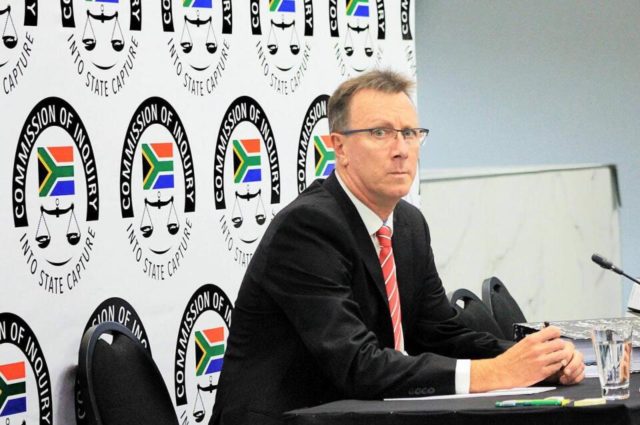There were mainly two types of products that were purchased
WATER purification plants and self-generating oxygen tanks supplied to various municipalities in the Northern Cape in the so-called ‘Amigos case’ became the focus of attention at the Zondo commission into state capture this week.
Giving evidence at the commission, PricewaterCoopers (PwC) forensic auditor Trevor White explained that Intaka was a name of a Cape Town-based entity that supplied water purification plants and self-generating oxygen plants to the Department of Health and the Department of Local Government in KwaZulu-Natal as well as to various municipalities in the Northern Cape.
“It’s called Intaka because it’s the name of the entity but it was also colloquially called the Amigos because that is the manner in which Dr (Gustav) Savoi, the owner and main shareholder of Intaka, referred to people in e-mails and letters.”
White stated that the case related to allegations of procurement irregularities around the appointment of this entity as well as allegations of corrupt payments made by Intaka to various officials within the Department of Health and Local Government both in the Northern Cape and KZN as well as alleged payments to the political heads of the departments.
White added that initially PwC was appointed by the Department of Health in KZN in May 2009 to investigate the initial contracts that the Department of Health had entered into.
“Our mandate was further extended in February of 2010 and it was then identified that this case was a lot bigger than the Department of Health as it also involved local government in KZN as well as significant payments to entities in the Northern Cape.”
By the end of White’s investigation, he said, he had identified 23 suspects, 18 of them natural persons, and revealed that a total of R144 million had left the coffers of the provincial departments of Health and Local Government in irregular deals with Intaka Holdings.
White explained that there were mainly two types of products that were purchased.
“The one was Oxyintaka self-generating oxygen plants, which was a plant designed by Intaka and was installed on site at hospitals. Its benefit was that it generated oxygen on site so there was no need for tankers or cylinders to be trucked to the sites.
“Those were purchased in KZN and in the Northern Cape.”
He stated that there were also water purification plants that were purchased by the Department of Health in KZN and in the Northern Cape and by local government in KZN as well as by some municipalities in the Northern Cape.
“In addition to that there was also the procurement in the Northern Cape of 16 dialysis machines, also from Intaka, but these were not made by Intaka or under license from them. They were bought from a third party.”
According to White, there was evidence that lntaka gave input into the specifications prior to these being made available to prospective bidders.
White told the commission that the specifications for the procurement of these plants appear to have been structured in such a way that lntaka was the preferred supplier.
He pointed out that the acquisition of the self-generating oxygen plants was a controversial decision and was not supported by a large portion of the medical practitioners in both the Northern Cape and KZN.
The dialysis machines that were purchased for the Northern Cape Department of Health were in many instances not used and more than a year later were still in their original packaging.
In many Instances, the hospitals at which the water purification plants had been installed did not have the budget to procure the required chemicals and as a result the plants were bypassed and not used.
“In certain instances, the water purification plants were either used for a short period, or not used at all. In one instance, a water purification plant was installed at a hospital in the Northern Cape that was in the process of being relocated. Consequently the plant was never used.”
He pointed out further that the investigation revealed that lntaka representatives secured cover quotations from associated parties thereby enabling them to circumvent supply chain management (SCM) procedures and obtain contracts at inflated prices.
A criminal case against former ANC provincial chairperson John Block, the CEO of Intaka, Gaston Savoi, the former CFO at the Department of Health, Daniel Gaborone, and the former director of supply chain management at the Department of Health, Sanjay Mittah, relating to their involvement in the Intaka matter was scrapped from the roll in August 2018 following the unsuccessful application for a lengthy remand in the Kimberley Magistrate’s Court.
The charges related to water purifiers and oxygen machines that were purchased for health facilities in the Northern Cape from Intaka Holdings, with the State alleging that inflated prices were charged and kickbacks were paid.
Charges of fraud, corruption and money laundering were also opened against Block, Savoi and Fernando Praderi from Intaka Holdings, former Sol Plaatje mayor Patrick Lenyibi, former municipal manager Frank Mashilo and former chief financial officer Nandi Madiba, in connection with the purchase of six water purifiers, valued at R2.7 million, for Ritchie that were never installed.
These charges were also provisionally withdrawn due to unending delays that were said to be “bedevilling” the case since the matter was first brought to court in 2011.
The Northern Cape High Court also provisionally withdrew the charges against the former director of supply chain management at the Department of Health, Sanjay Mittah, relating to the purchase of 16 dialysis machines for health facilities in the Northern Cape. The accused in this case was charged with fraud, forgery, uttering and money laundering.








